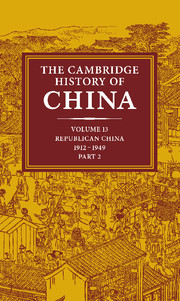Book contents
- Frontmatter
- 1 Introduction: perspectives on modern China's History
- 2 China's international relations 1911–1931
- 3 Nationalist China during the Nanking decade 1927–1937
- 4 The Communist movement 1927–1937
- 5 The agrarian system
- 6 Peasant movements
- 7 The development of local government
- 8 The growth of the academic community 1912–1949
- 9 Literary trends: the road to revolution 1927–1949
- 10 Japanese aggression and China's international position 1931–1949
- 11 Nationalist China during the Sino-Japanese War 1937–1945
- 12 The Chinese Communist movement during the Sino-Japanese War 1937–1945
- 13 The KMT-CCP conflict 1945–1949
- 14 Mao Tse-Tung's thought to 1949
- Bibliographical Essays
- Bibliography
- Conversion table: pinyin to Wade-Giles
- Index
- Republican China - physical features">
- References
7 - The development of local government
Published online by Cambridge University Press: 28 March 2008
- Frontmatter
- 1 Introduction: perspectives on modern China's History
- 2 China's international relations 1911–1931
- 3 Nationalist China during the Nanking decade 1927–1937
- 4 The Communist movement 1927–1937
- 5 The agrarian system
- 6 Peasant movements
- 7 The development of local government
- 8 The growth of the academic community 1912–1949
- 9 Literary trends: the road to revolution 1927–1949
- 10 Japanese aggression and China's international position 1931–1949
- 11 Nationalist China during the Sino-Japanese War 1937–1945
- 12 The Chinese Communist movement during the Sino-Japanese War 1937–1945
- 13 The KMT-CCP conflict 1945–1949
- 14 Mao Tse-Tung's thought to 1949
- Bibliographical Essays
- Bibliography
- Conversion table: pinyin to Wade-Giles
- Index
- Republican China - physical features">
- References
Summary
From earliest times, the quality of China's political system as a whole was thought to be no better than the quality of government at the lowest levels. Late Ch'ing political theory was heir to a longstanding debate about the merits and defects of the existing bureaucratic system as it affected local communities. What would be the costs and benefits if counties were administered by natives rather than by centrally chosen outsiders? To what degree could the bureaucratic state risk the participation of local persons? After 1860 the needs of the modernizing state posed these old questions in acute form. If national strength required the mobilization of popular energies, through what local channels could such energies best be enlisted? If the state required more money, through what local institutions might it best be acquired? In the twentieth century, military modernization, the expanded and Westernized school systems, modern-style police forces – all required that the state find ways to control local society better and extract more resources from it.
Even as the state was impelled to penetrate local society in new and more effective ways, attention was also directed to local government by the ideologies of popular movements. Nationalism was a great mobilizer: as the fate of China was increasingly seen to be everybody's business, new groups clamoured for access to politics. These were predominantly the commercial classes and new-style school graduates of the modernizing cities, but also included some landlords and old-style examination graduates in the hinterland. Constitutional government would require a bottom-upwards model of political development: a legitimate national parliament had to be preceded by surveying and certifying an electorate.
Keywords
- Type
- Chapter
- Information
- The Cambridge History of China , pp. 329 - 360Publisher: Cambridge University PressPrint publication year: 1986
References
- 3
- Cited by

